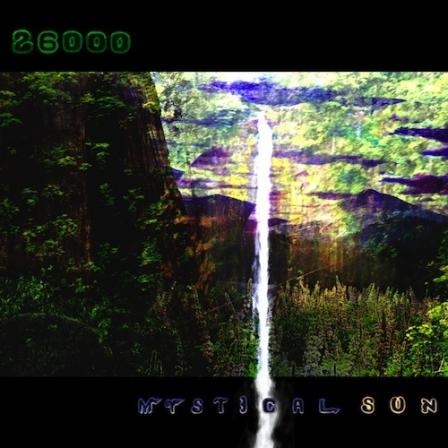Mystical Sun has been making verdant listening-room electronica for almost two decades – but you wouldn't guess it from a glance at his slim discography. The recently-released 26000 is his first album in four years. It's a testament to the time-intensive work of quality studio production and, poetically, also a concept album about deep time and epochal cycles. Fittingly, it is both an epic and liminal release, flowing back and forth from lush, propulsive bedroom music like "Haleakala" and cosmically patient temple psybience like "Place of Refuge." (Conceive to that track, seriously.) The opening and closing tracks ("Enchanted" and "26000") both sound like anthems for a global dance meditation happening in a spa. Their spacious and cinematic feel is perfect for driving, prayer, or making love.
Mystical Sun's attention to atmospheric noises make this album easy to "walk into" even on laptop speakers – although here is an effort that deserves (and rewards) high-fidelity listening. It's a beautiful sculpture in sound, and if any complaint can be made against 26000, it is a sculptural one: these deep and contemplative tunes sometimes fail to strike the balance between weight and movement that quickens a masterpiece like the Pietà.
Even with the rushing water and birdcalls, the live instrumentation, and the intricate shifting effects, the album's stillness speaks over its sound. This is clearly the product of years working in screen-lit darkness, too perfect to be real, just slightly stilted in moments that could have otherwise burst open transcendentally. And there's a fine line between the hypnotic and the repetitive. Sometimes, in spite of the delicious auteur grandeur, it seems like he lost the forest for the trees.
What makes this album great is the time and attention you can hear and feel in every second of its playing. This is one for triggering spiritual experiences, especially for meditative listeners. 26000 is a treat, as long as you don't mind its chrome-flower artificial beauty, its porcelain poses, and the occasionally impersonal visionary realms it opens.
I just finished a great correspondence with the enigmatic and anonymous "Richard" behind Mystical Sun. Read on below the videos for our conversation on tantric listening, fringe archeology, and the role organic electronica in our digital ecosystem.
Watch the first video, for "Casseipoeia":
Watch the the official video for "26000":
Michael Garfield: What's up with your album title? I'm used to seeing cheeky retro-futurist branding on electronic music – you know, "Year 2000" kind of stuff – but 26000 has a jungle on the album cover and the music doesn't sound robotic or hipster-synth at all (which is an accomplishment, by the way). Given your perfectionist sound production, I have to believe that the name figures heavily into what this music means to you and how you expect it to be heard…
Mystical Sun: Hi Michael. You've picked up on an important aspect of the album – it's inspired particularly by forests and organic living systems. On 26000 my ears tuned into a sound that's more natural, dream-like, and cinematic.
The title 26000 was chosen because it works on multiple levels. On one level it's the number of years of the precession of the equinoxes, the Earth's wobble on its axis. This is a very important cycle because it's a driver of change on the planet. Coincidentally, it's also around the distance in the light-years to the black hole at the center of the Milky Way Galaxy. Twenty six is a fractal number found in the microcosm and macrocosm of our experience.
So, would you say that you're hoping people become aware of these larger patterns through your music? You're not alone in this growing emphasis on an organic expression of the digital ecology, using the computer to make music that evokes wetter and more complex realities. (Even ideas like "digital ecology" suggest it's no longer adequate to divide the world into categories of "natural" and "artificial.") Why do you feel it's so important to draw people's attention to this stuff, and how did that inform the time you spent in the studio?
Civilization goes back beyond 12,000 years and astronomy has always been deeply important to the ancient civilizations. Why? Knowing the Moon and Sun cycles are really enough to handle the seasons, cultivate agriculture, etc. The detailed level of ancient astronomical knowledge found in the Maya, Dogon, Sumerian, and Egyptian traditions far exceeds what would be required to have a thriving material culture. The title 26000 is simply echoing and reminding people of this somewhat lost, or, at least to some extent, intentionally ignored knowledge of the "great year" cycle.
When I'm in the studio and creating music, I often imagine a lost time on Earth when humans lived in a paradise, and it's this feeling that I attempt to infuse into the music of the 26000. If someone can listen to 26000 and come away from the experience feeling like they were able to separate for a short time from the chaos of the world then I have done my job.
On 26000 I perform sarod, sitar, guitar, and ukulele on tracks that have sounds that don't exist in nature. I'm not focusing on the distinctions between natural or synthetic; instead, I try and uncover the appropriate sound for the moment in music. This approach is also evident with the 26000 mini-movie that I'm currently working on where I'm in scenes where I look synthesized or real.
"Synthesized or real," ha! I know that you made a lot of your tracks using sounds you designed, many of which seem to be manipulated nature sounds like birdcalls and rushing water. Also, that nada yoga, or the yoga of sound and listening, is a big part of your process. And your tracks combine spacious ambience with clear rhythmic and melodic elements, often at once. From one found-sound aficionado to another, what to you is the relationship between "music" and "noise?" (I mean, there are bird noises, and then there is bird song.)
The relationship between "music" and "noise" is that they're from the same source and everything else is just subtle differences. I don't distinguish between the two. All Mystical Sun albums have at least one bird sample and nature sounds. Some of the bird samples on 26000 I recorded myself in Hawaii and others are from a Costa Rican rainforest album which I have permission to sample. Ambience and atmospherics are an important aspect to this music because I use them to create a sense of place. Typical music is about relationships, emotions, stories, opinions, politics, etc. The vision I have for my music is closer to virtual reality: I'm not writing songs about what's happened in my life, I'm attempting to create music that transports listeners out of the day-in/day-out world, like a good science fiction movie might. This can make my music a bit oblique to the casual listener, but that's okay – I'm creating the music for the small niche of people who are looking for something else. The structure of the songs follows nature and is non-repeating – they start simple and become more complex and morph over time. I like to insure that in a track each second is unique and not repeated.
Epic time scales, huge numbers, fantasy soundscapes…your focus seems to be on pulling people out of their ordinary state of consciousness and into a much vaster and more legendary context. Is this an end unto itself, for you? Or are you trying to catalyze something specific with all of this emphasis on the ancient, the hidden, the unobserved, and the transcendental? (I mean, we live in a postmodern circus of cultural recombination, now – and form is not the same as substance. Historian William Irwin Thompson criticized Avatar, for example, as being just more decorative floral engraving on the barrel of the military industrial complex.)
We are a species with amnesia and because of this we are not fully rooted. One of my purposes is to conjure a larger sense of deep awareness by triggering these buried morphogenetic memories with sound; it's in our genetic records. Ever since I could read I've been reading about ancient civilizations, and over time, instead of our understanding [of our past on this planet] becoming clearer, the story has become far more complex and nuanced.
In the past century a number of traditional models of human history have been obliterated along with our simple Newtonian ideas of the "universe" (in quotes because we know there is more than one now), and still, for the most part our culture plods along blindly off a cliff of hyper-individualism and short sightedness, thinking we are the best and brightest. We assume that there is a straight line from living in caves to surfing the internet, and this is incredibly naïve thinking and is demonstrably false. The fossil record shows humans who are completely modern for hundreds thousands of years and only modern behavior very recently? That doesn't add up. What also doesn't add up is our ancestors around ten thousand years ago had larger brains that we do. Now throw into the mix other species of humans like Neanderthal, Denisovan and other archaic human forms concurrently existing with us and interbreeding, and these very unusual people with elongated skulls who tend to be found around pyramid cultures and it gets even more intriguing. The other mystery is just how did early peoples build megalithic architecture without technology and why would they choose the most difficult materials to work with?
We are being directly challenged by those who came before us to decode this, and instead we prefer to spend our days in a mechanical existence behaving robotically. In fact, our history becomes more like science fiction the more we look into it. The key to the future is in our past and our past was probably more exciting and interesting than our present. Here's the crux of the issue: what happened to erase our memories and force a hard reboot of humanity, and why did the other species of humans die out along with the megafauna?
I'm reading a great book by Professor Robert Schoch, Forgotten Civilization, and in it he lays out a compelling argument for a period of solar outbursts which effectively incinerate the Earth in some as of yet not fully understood cycle of solar reorganization. Around 12,000 years ago the Ice Age abruptly ended in the span of a only few years. Our ancestors like we do today tended to hug to the coastlines and rivers, when the ice melted the millions of square miles of land were submerged under water. Unless we start focusing on what happened to these ancient peoples, we should expect to experience a similar fate.
I'm absolutely convinced that in the past humanity had higher levels of technology than we do today, and we were vastly more intelligent and wise. Think of it this way: I'm some type of sonic archeologist writing songs about topics that are not based in the modern world. Oh and about Avatar: our past on this planet is even more unusual than that. I have a movie idea, but you know, I don't have the resources and contacts to realize it, so I'm doing the best I can with the tools available.
Well! I think that should be tantalizing enough that anyone will want to give 26000 a spin. (Perhaps better mountaintop listening than beach listening, though, yes?) There is some music that seems to scream for a film to play behind it, and it makes sense that this extremely cinematic album would have its glimmering digital roots in the imaginal form of a movie. And the theme is apropos for our age of archaic revival – the internet exhuming cultures as fast as it buries them, tantalizing us with the romantic imagery of a world we can see but not touch.
I just listened to a conversation between author Erik Davis and illustrator Arik Roper on Expanding Minds in which they discussed the unusual congruency between past and future: cyborg vikings and post-apocalyptic shamans; how the future of H.G. Wells' Time Machine presents a future that seems more like our academy-sanctioned Past; and how the revisionist archeology of Ancient Aliens presents a past that resembles the future of transhumanist science fiction. I've been talking a lot lately about how our myths of origin and destiny say more about our notions of self than they do about the "reality" of our situation, that they represent two horizons, like East and West, on a sphere of infinite possibilities, and as we change, so too does our story.
In light of that, I hear 26000 as a statement of your own creative being, equally valid as a window into past and future. What is the world you are so dedicated to expressing with your music? (That'll probably be the last question.)
26000 is expressing a world where we live in the imagination and explore our own individual creativity within. Instead of composing songs about subjects and telling listeners what to think, 26000 is intended to be interpreted in the symbols and language that the listener brings to it. I think the job of an artist is to take in what's going on in the outer world and their inner world and reflect this back to culture in their own unique way. At this chaotic and transformative point is history that's all I'm attempting. Good science fiction is often prescient and even sometimes prophetic, and the notion of the past being more advanced than the future does have a kind of cyclical logic to it. It's hard to imagine another 100 years of our current civilization continuing on this trajectory. Personally, I believe in the cycle of world ages found in many ancient traditions. They state that we are currently crossing over from a dark age of materialism, and that another golden age awaits us in the future, followed again by a fall, and on and on. It certainly would explain a lot of outliers in ancient history. The key to this cycle is precession, and that brings us full circle to 26000. Maybe I'm unconsciously leaving a digital artifact for some future civilization to decode. Who knows how long the bits of this music will exist?
The best way to listen to 26000 is late at night, right before sleep. Enter the horizontal dimension and get comfortable with headphones and drift off while listening to it. The borderline of sleep and consciousness is where this music actually exists. Think of 26000 as music for the twilight of consciousness.
So now that you've emerged from four years in a music production cave and have this beautiful thing to share, what's next?
When I completed 26000 I decided to take time off of composing new music until 2013. During this time I've been practicing my Indian instruments the Sarod and Sitar, learning Ragas, and focusing on creating images and videos for 26000.
Paleontologist-turned-performing philosopher Michael Garfield uses all available media to playfully and provocatively deconstruct the boundaries between individual and collective, art and science, the sacred and the mundane. He lives in Austin, Texas. Follow him @michaelgarfield














